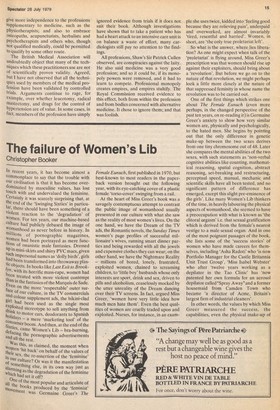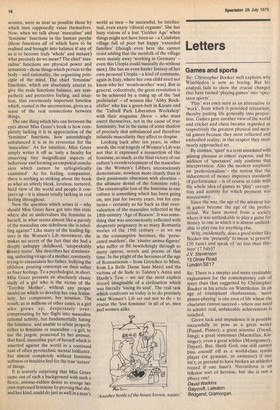The failure of Women's Lib
Christopher Booker
In recent years, it has become almost a commonplace to say that the trouble with our civilisation is that it has become overdominated by masculine values, has lost touch with and undervalued the feminine. Certainly it was scarcely surprising that, at the end of the 'Swinging Sixties' in particular, there should have been something of a Violent reaction to the 'degradation' of women. For ten years, our machine-based , culture had publicly debased the image of Womanhood as never before in history. In millions of pornographic magazines, Women had been portrayed as mere functions of onanistic male fantasies. Dressed up in mini-skirts and shiny PVC macs, given such impersonal names as 'dolly birds', girls had been transformed into throwaway plastic objects. In books like Last Exit to Brooklyn, with its horrific mass-rape, women had been treated with more violent contempt than in the fantasies of the Marquis de Sade. Even on the more 'respectable' outer surface of our culture, in the TV commercials and colour supplement ads, the bikini-clad girl had been used as the single most exploited stereotype to sell anything from drink to motor cars, deodorants to Spanish holidays — a mere 'marketing tool' of the consumer boom. And then, at the end of the S_ixties, came Women's Lib — bra-burning, defacing the pornographic advertisements and all the rest. Was this, as claimed, the moment when WO en 'hit back' on behalf of the values of !heir sex, the re-assertion of the 'feminine' ifl. our culture? Or was it the manifestation of something else, in its own way just as alarming as the degradation of the feminine Which had set it off? alPe of the most popular and articulate of tilhe hooks produced by the 'feminist' movement was Germaine Greer's The Female Eunuch, first published in 1970, but best-known to most readers in the paperback version brought out the following year, with its eye-catching cover of a plastic female 'torso-cover' swinging from a rail.
At the heart of Miss Greer's book was a savagely contemptuous attempt to contrast the public image of womanhood usually presented in our culture with what she saw as the reality of most women's lives. On the one hand, we have the Dream of the TV ads, the Romantic novels, the Sunday Times women's page profiles of successful millionaire's wives, running smart dinner parties and being rewarded with all the jewels and expensive clothes they can wear; on the other hand, we have the Nightmare Reality — millions of bored, lonely, frustrated, exploited women, chained to screaming children, to 'little boy' husbands whose only interests are sport, drink and sex, driven to pills and alcoholism, ceaselessly mocked by the utter unreality of the Dream dancing over their TV screens. In fact, argued Miss Greer, 'women have very little idea how much men hate them'. Even the best qualities of women are cruelly traded upon and exploited. Nurses, for instance, in an exam pie she uses twice, kidded into 'feeling good because they are relieving pain', underpaid and overworked, are almost invariably 'tired, resentful and harried'. Women, in short, are 'the only true proletariat left'.
So what is the answer, where lies liberation? As one might expect when talk of the 'proletariat' is flying around, Miss Greer's prescription was that women should rise up against their exploiters, should bring about a 'revolution'. But before we go on to the nature of that revolution, we might perhaps look a little more closely at the nature of that suppressed feminity in whose name the revolution was to be carried out.
One of the first things which strikes one about The Female Eunuch (even more perhaps, in the changed perspective of the past ten years, on re-reading it) is Germaine Greer's anxiety to show how very similar women are, physically and psychologically, to the hated men. She begins by pointing out that the only difference in genetic make-up between the two sexes derives from one tiny chromosome out of 48. Later she compares the mental abilities of the two sexes, with such statements as 'non-verbal cognitive abilities like counting, mathematical reasoning, spatial cognition, abstract reasoning, set-breaking and restructuring, perceptual speed, manual, mechanic and scientific skills have all been tested, and no significant pattern of difference has emerged, except this slight pre-eminence of the girls'. Like many Women's Lib thinkers of the time, in heavily labouring the physical aspects of womanhood, she seemed to have a preoccupation with what is known as 'the clitoral orgasm' i.e. that sexual gratification which is derived from the female's nearest vestige to a male sexual organ. And in one of the most poignant passages of the book, she lists some of the 'success stories' of women who have made careers for themselves, including 'Asha Radoti' who 'is now Portfolio Manager for the Castle Britannia Unit Trust Group', 'Miss Isabel Webster' who after 'twelve years working as a depilator in the Tao Clinic' has 'now patented her own formula for an aerosol depilator called "Spray Away" and a former housemaid from Camden Town who became 'a director of Acme, Britain's largest firm of industrial cleaners'.
In other words, the values by which Miss Greer measured the success, the capabilities, even the physical make-up of women, were as near as possible those by which men supposedly value themselves. Now, when we talk about 'masculine' and 'feminine' functions in the human psyche (those functions all of which have to be realised and brought into balance if any of us is to become truly 'whole' and mature) what precisely do we mean? The chief 'masculine' functions are physical power and sensation — those things which pertain to the body — and rationality, the organising principle of the mind. The chief 'feminine' functions, which are absolutely crucial to give the male functions balance, are sympathetic and protective feeling, and intuition, that enormously important function which, rooted in the unconscious, gives us a sense of the real connections between things.
The one thing which hits one between the eyes about Miss Greer's book is how completely lacking it is in appreciation of the 'feminine' functions, how astonishingly unbalanced it is in its reverence for the 'masculine'. As for intuition, Miss Greer simply writes it off as 'only a faculty for observing tiny insignificant aspects of behaviour and forming an empirical conclusion which cannot be syllogistically examined'. As for feeling, compassion, there is nothing so striking about the book as what an utterly bleak, loveless, tortured, hard view of the world and people it conjures up — it is almost totally lacking in real feeling throughout.
Now the question which arises is — why should Miss Greer have got into this state where she so undervalues the feminine in herself, in what seems almost Rea parody of the masculine one-sidedness she is rebelling against? Like many of the leading figures in the Women's Lib movement, she makes no secret of the fact that she had a deeply unhappy childhood, 'unspeakably dreary teens'. She describes her domineering, unfeeling virago of a mother, constantly trying to emasculate her father, bullying the children, pouring contempt on their softer or finer feelings. To a psychologist, in short, Miss Greer presents an absolutely classic study of a girl who is the victim of the 'Terrible Mother', without any proper model on which to develop her own femininity, her compassion, her intuition. The result, as in millions of other cases, is a girl who grows up, desperately over compensating by her flight into masculine rational activity, but fundamentally hating the feminine, and unable to relate properly either to feminine or masculine — a girl, to use the jargon, possessed by her animus, that hard, masculine part of herself which is asserted against the world in a continual rant of often pyrotechnic mental brilliance, but almost completely without feminine softness orintuitive feel for the true 'nature' of things.
It is scarcely surprising that Miss Greer came out of such a background with such a fierce, animus-ridden desire to avenge her own repressed feminine by proving that she, and her kind, could do just as well in a man's world as men — be successful, be intellectual, even enjoy 'clitoral orgasms'. She has hazy visions of a lost 'Golden Age' when things might not have been so — a Calabrian village full of poor but happy 'extended families' (though even here she cannot resist adding that the menfolk of the village were mainly away 'working in Germany' — even this Utopia could basically do without men). She has an even hazier fantasy of her own personal Utopia — a kind of commune, again in Italy, where her own child need not know who her 'womb-mother' was). But in general, collectively, the great revolution is to be achieved by a rising up of the 'last proletariat' — of women like 'Abby Rockefeller' who has a green-belt in Karate and the `Tufnell Park Liberation Workshop' with their magazine Shrew — who must assert themselves, not in the cause of true femininity, but in the name of some shadow of precisely that unbalanced and therefore infantile masculinity they affect to despise.
Looking back after ten years, in other words, the real tragedy of Women's Lib was not that it expressed a reassertion of the feminine, so much, as the final victory of our culture's overdevelopment of the masculine (as the Women's Libbers unconsciously demonstrate, nowhere more clearly than in their passionate obsession with abortion — the ultimate denial of the feminine role). The catastrophic loss of the feminine in our culture is something which has been going on, not just for twenty years, but for centuries — certainly as far back as that overvaluation of the masculine reflected in the 18th-century 'Age of Reason'. It was something that was unconsciously reflected with desperate poignancy in so many Romantic stories of the 19th century — as we see in the consumptive heroines, the 'persecuted maidens', the 'elusive anima-figures' who suffer or flit bewitchingly through so many operas, novels and poems of that time. In the plight of the heroines of the age of Romanticism — from Gretchen to Mimi, from La Belle Dame Sans Merci and the victims of de Sade to Tolstoy's Anna and Hardy's Tess — we see the most explicit record imaginable of a civilisation which was literally 'losing its soul'. The real task which confronts us today is to do precisely what Women's Lib set out not to do — to rescue the 'lost feminine' in all of us, men and women alike.







































 Previous page
Previous page